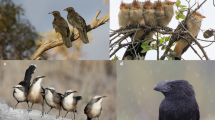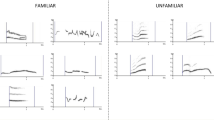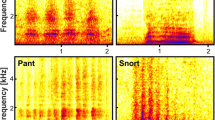Abstract
Mutual recognition between birds is apparently based on sound as well as sight. Analysis of the calls of individuals of certain species of colony-nesting birds shows that each is measurably distinct, and that the overall relationship of the component parts is important in recognition.
This is a preview of subscription content, access via your institution
Access options
Subscribe to this journal
Receive 51 print issues and online access
$199.00 per year
only $3.90 per issue
Buy this article
- Purchase on Springer Link
- Instant access to full article PDF
Prices may be subject to local taxes which are calculated during checkout
Similar content being viewed by others
References
Chomsky, N., and Lenneberg, E., in The Structure of Language (edit. by Fodor, J. A., and Katz, J. J.) (Prentice–Hall, New Jersey, 1964).
Teuber, H. L., in Brain Mechanisms Underlying Speech and Language (edit. by Millikan, C. H., and Darley, F. L.) (Grune and Stratton, NY and London, 1967).
Coulson, J. C., Anim. Behav., 14, 189 (1966); J. Anim. Ecol., 35, 269 (1966).
Ashmole, N. P., and Humbertotovar, S., Auk, 85, 90 (1968).
Morley, A., Brit. Birds, 35, 261 (1942).
Lack, D., Proc. Zool. Soc., A, 109, 169 (1939).
Hochbaum, H. A., The Canvas Back on a Prairie Marsh (Washington, 1944).
Tinbergen, N., The Herring Gull's World (Collins, London, 1953).
Cherry, C., On Human Communication, 277 (Chapman and Hall, London, 1957).
Gibson, J. J., The Senses Considered as Perceptual Systems, 87 (Allen and Unwin, London, 1968).
Tinbergen, N., Ardea, 20, 1 (1931).
Palmer, R. S., Proc. Boston Soc. Nat. Hist., 42, 1 (1941).
Stonehouse, B., The king Penguin (Aptenodytes patagonica) of South Georgia. Falkland Islands Dependencies Survey, Sci. Rep. No. 23 (1960).
Tschanz, B. B., Behaviour, 14, 1 (1959); Verh. Schweiz. Natur. Ges., 211 (1964).
Hutchison, R. E., Stevenson, J. G., and Thorpe, W. H., Behaviour (in the press).
Rowell, T. E., and Hinde, R. A., Proc. Zool. Soc. Lond., 138, 279 (1962).
Moynihan, M., Smithsonian Misc. Coll., 146, No. 5 (1964).
Laws, R. M., C.R. First SCAR Symposium, 408 (Harmann, Paris, 1964).
Norris, K. S., Whales, Dolphins and Porpoises (Univ. of California Press, Los Angeles, and Cambridge Univ. Press, London, 1966).
Caldwell, M. C., and Caldwell, D. K., Nature, 207, 434 (1965).
Tschanz, B. B., Experientia, 18, 1 (1962).
Author information
Authors and Affiliations
Rights and permissions
About this article
Cite this article
THORPE, W. Perceptual Basis for Group Organization in Social Vertebrates, especially Birds. Nature 220, 124–128 (1968). https://doi.org/10.1038/220124a0
Received:
Issue Date:
DOI: https://doi.org/10.1038/220124a0
This article is cited by
Comments
By submitting a comment you agree to abide by our Terms and Community Guidelines. If you find something abusive or that does not comply with our terms or guidelines please flag it as inappropriate.



